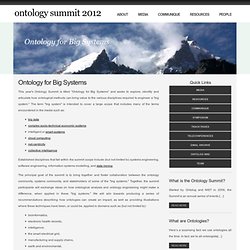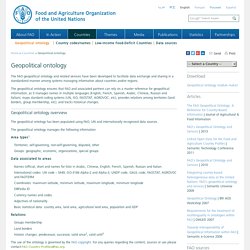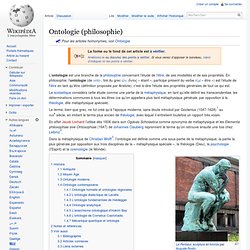

Ontology Summit 2012. This year's Ontology Summit is titled "Ontology for Big Systems" and seeks to explore, identify and articulate how ontological methods can bring value to the various disciplines required to engineer a "big system.

" The term "big system" is intended to cover a large scope that includes many of the terms encountered in the media such as: Established disciplines that fall within the summit scope include (but not limited to) systems engineering, software engineering, information systems modelling, and data mining. The principal goal of the summit is to bring together and foster collaboration between the ontology community, systems community, and stakeholders of some of the "big systems. " Ontologyfreak.com. Academia.edu - Share research. Ontology: Philosophical and Computational. Ncbo. NCOR. Buffalo Ontology Site. Barry Smith, National Center for Ontological Research.
About WordNet - WordNet - About WordNet. OpenCyc.org. Information géopolitique. The FAO geopolitical ontology and related services have been developed to facilitate data exchange and sharing in a standardized manner among systems managing information about countries and/or regions.

The geopolitical ontology ensures that FAO and associated partners can rely on a master reference for geopolitical information, as it manages names in multiple languages (English, French, Spanish, Arabic, Chinese, Russian and Italian); maps standard coding systems (UN, ISO, FAOSTAT, AGROVOC, etc); provides relations among territories (land borders, group membership, etc); and tracks historical changes. Geopolitical ontology overview. Web Sémantique:Ontologie. Ontology (information science) In computer science and information science, an ontology formally represents knowledge as a hierarchy of concepts within a domain, using a shared vocabulary to denote the types, properties and interrelationships of those concepts.[1][2] Ontologies are the structural frameworks for organizing information and are used in artificial intelligence, the Semantic Web, systems engineering, software engineering, biomedical informatics, library science, enterprise bookmarking, and information architecture as a form of knowledge representation about the world or some part of it.
The creation of domain ontologies is also fundamental to the definition and use of an enterprise architecture framework. The term ontology has its origin in philosophy and has been applied in many different ways. The word element onto- comes from the Greek ὤν, ὄντος, ("being", "that which is"), present participle of the verb εἰμί ("be"). According to Gruber (1993): Common components of ontologies include: Ontologie (informatique) Un article de Wikipédia, l'encyclopédie libre.

Par analogie, le terme est repris en informatique et en science de l'information, où une ontologie est l'ensemble structuré des termes et concepts représentant le sens d'un champ d'informations, que ce soit par les métadonnées d'un espace de noms, ou les éléments d'un domaine de connaissances. L'ontologie constitue en soi un modèle de données représentatif d'un ensemble de concepts dans un domaine, ainsi que des relations entre ces concepts. Elle est employée pour raisonner à propos des objets du domaine concerné. Plus simplement, on peut aussi dire que l' « ontologie est aux données ce que la grammaire est au langage ». Ontologie (philosophie) Un article de Wikipédia, l'encyclopédie libre.

L'ontologie est une branche de la philosophie concernant l'étude de l'être, de ses modalités et de ses propriétés. En philosophie, l'ontologie (de onto-, tiré du grec ὤν, ὄντος « étant », participe présent du verbe εἰμί « être ») est l'étude de l'être en tant qu'être (définition proposée par Aristote), c'est-à-dire l'étude des propriétés générales de tout ce qui est. La scolastique considéra cette étude comme une partie de la métaphysique, en tant qu'elle définit les transcendentiae, les déterminations communes à tous les êtres (ce qu'on appellera plus tard métaphysique générale, par opposition à la théologie, dite métaphysique spéciale).
Le terme, bien que grec, ne fut créé qu'à l'époque moderne, sans doute introduit par Goclenius (1547-1628)[1] au XVIIe siècle, en imitant le terme plus ancien de théologie, avec lequel il entretient toutefois un rapport très voisin. Heidegger appelle ontique ce qui se restreint à l'étant au lieu de l'être.